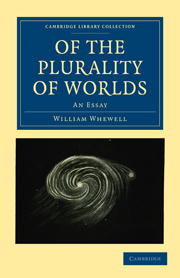Book contents
- Frontmatter
- Preface
- Contents
- CHAPTER I ASTRONOMICAL Discoveries
- CHAPTER II Astronomical Objection to Religion
- CHAPTER III The Answer from the Microscope
- CHAPTER IV Further Statement of the Difficulty
- CHAPTER V Geology
- CHAPTER VI The Argument from Geology
- CHAPTER VII The Nebulsæ
- CHAPTER VIII The Fixed Stars
- CHAPTER IX The Planets
- CHAPTER X Theory of the Solar System
- CHAPTER XI The Argument from Design
- CHAPTER XII The Unity of the World
- CHAPTER XIII The Future
CHAPTER XII - The Unity of the World
Published online by Cambridge University Press: 05 October 2010
- Frontmatter
- Preface
- Contents
- CHAPTER I ASTRONOMICAL Discoveries
- CHAPTER II Astronomical Objection to Religion
- CHAPTER III The Answer from the Microscope
- CHAPTER IV Further Statement of the Difficulty
- CHAPTER V Geology
- CHAPTER VI The Argument from Geology
- CHAPTER VII The Nebulsæ
- CHAPTER VIII The Fixed Stars
- CHAPTER IX The Planets
- CHAPTER X Theory of the Solar System
- CHAPTER XI The Argument from Design
- CHAPTER XII The Unity of the World
- CHAPTER XIII The Future
Summary
The two doctrines which we have here to weigh against each other are the Plurality of Worlds, and the Unity of the World. In so saying, we include, as in our present view, a necessary part of the conception of a World, a collection of intelligent creatures: for even if the suppositions to which we have been led, respecting the kind of unintelligent living things which may inhabit other parts of the Universe, be conceived to be probable; such a belief will have little interest for most persons, compared with the belief of other worlds, where reside intelligence, perception of truth, recognition of moral Law, and reverence for a Divine Creator and Governor. In looking outwards at the Universe, there are certain aspects which suggest to man, at first sight, a conjecture that there may be other bodies like the Earth, tenanted by other creatures like man. This conjecture, however, receives no confirmation from a closer enquiry, with increased means of observation. Let us now look inwards, at the constitution of man; and consider some characters of his nature, which seem to remove or lessen the difficulties which we may at first feel, in regarding the Earth as, in a unique and special manner, the field of God's Providence and Government.
In the first place, the Earth, as the abode of man, the intellectual creature, contains a being, whose mind is, in some measure, of the same nature as the Divine Mind of the Creator.
- Type
- Chapter
- Information
- Of the Plurality of WorldsAn Essay, pp. 248 - 264Publisher: Cambridge University PressPrint publication year: 2009First published in: 1853



